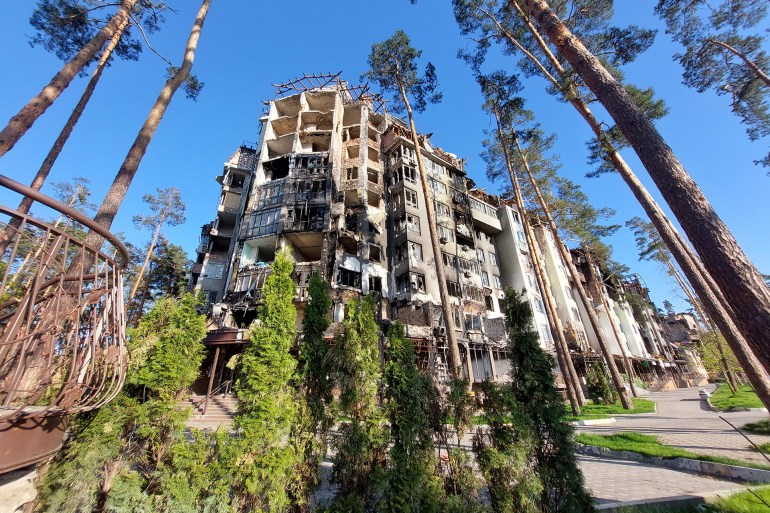In front of the charred building in the bombings, in which she lives in the city of Irbin, northwest of the capital, Kyiv, Ms. Halina, 78, uses firewood to cook food and prepare tea. Water, electricity, gas and heating have been cut off from the building for weeks, and will not resume soon.
Ms. Halina estimated that she lives on the outskirts of the old part of the city, not far from the city of Bucha and the road leading to the town of Hostomel, all of which were subjected to the fiercest bombings, and witnessed the fiercest battles and “the most terrible massacres”, according to the Ukrainian authorities, during the first weeks of the Russian war on Ukraine.
Halina told Al Jazeera Net that she "refused to help the volunteers to migrate, fearing for the fate of my crippled neighbor, and for the cats and dogs I take care of, and I think that the "King of Protection" saved me from death because of that, although I often turned myself into a position of survival."
She continues, "I saw all forms of death, starting from bombing, passing through the possibility of liquidation, and even suffocation due to smoke. Russian soldiers entered my house, and took pity on me and did not kill me. They were young, between the ages of 18-20. I told them: Go back to your homes and your families. He's threatening you here. They said they were following orders, then they left me, and they said they wouldn't kill me because I fed them."
According to her account, "Shechenyu Kadyrov (Chechen President Ramzan Kadyrov) was ruthless and cruel. They deliberately insulted and humiliated us, and they took men to kill them in the streets. This is what happened with two of our neighbors before my eyes."
And he concluded by saying, "Erbin withstood bravely, and was a fortress against the advance of the occupiers towards Kyiv. Our soldiers are heroes, and some of them reward me for my survival and patience by bringing the tulips I love."
Part of the damage to the building that houses Mrs. Helena's apartment, which led to the cutting off of all services (Al-Jazeera)
Destruction is everywhere
After passing the army checkpoints, whose procedures are still strict in comparison with the barriers of the capital itself, it is amazed who used to go to rest or take a walk on these northwestern corners of Kyiv.
The extent of the destruction in it is unmistakable, especially in the places around Hostomel Airport, or what is known as the airport of the “Antonov” airline, and near the “Bocha” train station, which is a major link linking Kyiv with the city, and then to many parts of the northwest. Ukraine.
All the bridges that connect those cities to Kiev were destroyed by the Ukrainian forces to prevent the Russians from advancing, and many apartment buildings have become charred and empty structures on their thrones, except for houses, warehouses, and gas stations that have been flattened.
Whoever walks between those areas is forced to take bumpy roads, and carefully cross dangerous internal bridges filled with potholes;
As for the smell of gunpowder and fires, it is still widespread and stuffy noses.
It became normal for the visitor to see burned cars in front of their owners' homes, and others that were delivered but filled with holes from shrapnel and bullets, and their broken windows were replaced with bags.
And because these areas are famous by their nature amidst the dense forests, the trees were not spared from the harm of war, so the stone shared its share of the blackness of burning as well.
Mrs. Helena stands in front of her severely damaged house building in Irbin (Al-Jazeera)
Life is hard to come back
Despite the darkening of the scene, life came to those areas again, about a month and a half after the withdrawal of the Russian forces, but the matter is taking place slowly and slowly, amid constant fears.
Some residents come back and stand in front of the rest of their homes to grieve over them, and others go beyond the ruins to their apartments to close their doors and windows with what they provide, so that they are not commonplace for those who wanted, and an expression - perhaps - of their love and the immortalization of memories in them, even if they are no longer livable.
The visitor to those areas notices the restoration operations spread everywhere, including the restoration of bridges, service networks, energy and railways, which helps in the return of the residents of those areas to their completely or relatively sound homes, and many shops and companies return to work, so that some residents have returned to exercise, and usually Hiking.
Andre - who is the owner of a coffee shop in Irbin - told Al Jazeera Net, "The situation was frightening in mid-April when I came back, the city was dark and empty of its residents, and it is still witnessing an intense military movement after the withdrawal of the Russians."
He added, "The situation has now improved a lot, but people's talk remains focused on fears that the city and Kiev will be targeted again by bombing or invasion, which pushes many to stay in areas of displacement and other countries of asylum."
The cities of Bucha and Irbin were granted heroic status by presidential decree as a reward for steadfastness, and this honor cost them - according to the local authorities - horrific massacres, and the spread of mass graves of at least 600 people.

